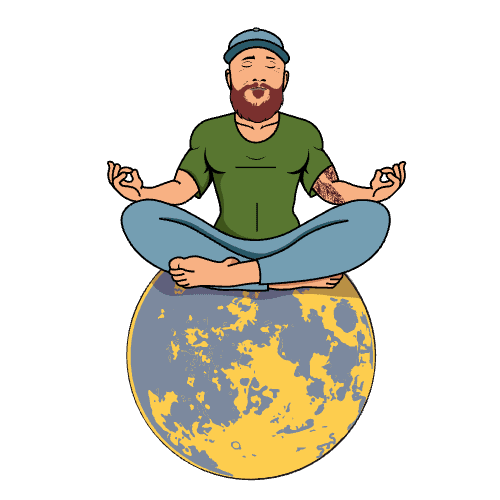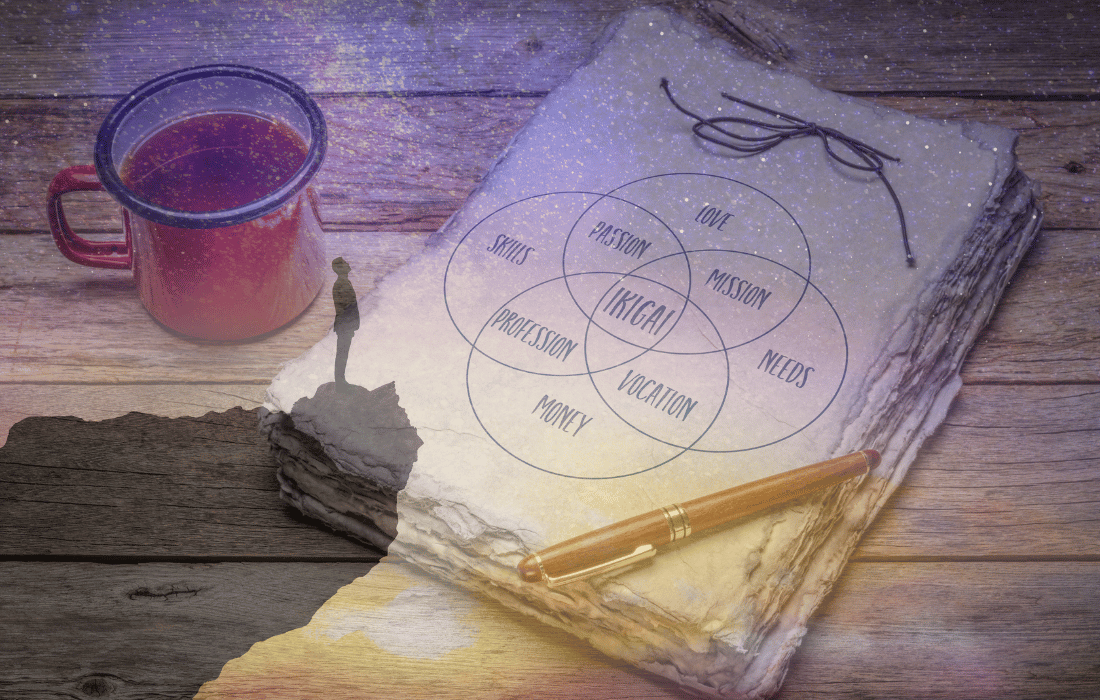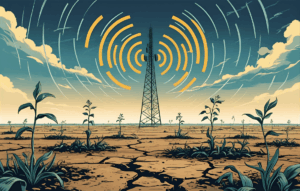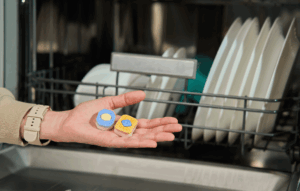In the heart of Okinawa, one of Japan’s Blue Zones where people live longer, healthier lives, there’s a concept that transcends mere lifestyle; it’s a philosophy for living well named Ikigai. This term, roughly translating to “a reason for being,” combines the words ‘iki’ (to live) and ‘gai’ (reason). But Ikigai isn’t just about living longer; it’s about living better, with purpose, passion, and fulfillment. Let’s delve deep into how this ancient wisdom can be a blueprint for modern life, enhancing our health, happiness, and holistic well-being.
What is Ikigai?
Ikigai is where four primary elements of life intersect:
- What you love (your passion)
- What the world needs (your mission)
- What you’re good at (your vocation)
- What you can be paid for (your profession)
This intersection creates a sweet spot where one can find not just temporary joy but a sustainable form of happiness and purpose.
The Origins and Evolution of Ikigai
The concept of Ikigai has its roots deeply embedded in the Japanese culture, often linked with longevity and mental health. Originating from the island of Okinawa, where the average lifespan is significantly higher than in the rest of Japan, Ikigai was traditionally about finding joy, fulfillment, and balance in daily life through social roles, contributions to family, and community. Over time, its interpretation has evolved to become a universal tool for self-discovery and life design. While traditional Ikigai was more about community roles and familial duties, today, it’s adapted to individual aspirations and global demands, reflecting the changing dynamics of society and personal identity.
Why Does Ikigai Matter in Today’s World?
In an era where burnout, stress, and a pervasive sense of aimlessness are rampant, Ikigai offers a beacon of hope. It’s not just about career or financial success but about aligning your life’s work with your inner values and societal contributions. Here’s why it’s pivotal:
- Mental Health: Finding your Ikigai can lead to lower stress levels, as you’re doing what you love and what you’re good at, reducing internal conflict and dissatisfaction. Studies have shown that individuals with a strong sense of purpose report higher levels of psychological well-being.
- Physical Health: Purpose-driven individuals often engage in healthier lifestyles, which correlates with better physical health outcomes. The synergy between mental and physical health through purpose is backed by extensive research.
- Longevity: The Blue Zones Project highlights how a sense of purpose contributes significantly to longevity, suggesting that those who have discovered their Ikigai tend to live longer, healthier lives.
- Work Satisfaction: In our professional lives, Ikigai can transform routine work into a calling, increasing job satisfaction and productivity.
- Social Connection: Engaging in activities that fulfill your Ikigai often involves community participation, and enhancing social bonds and support networks.
How to Find Your Ikigai
Finding your Ikigai isn’t a one-size-fits-all journey. Here’s how you can embark on this personal quest:
Step 1: Self-Reflection
- Passions: What activities make you lose track of time? What could you do for free and still feel fulfilled?
- Skills: What are you naturally good at? This could range from technical abilities like coding to interpersonal skills like empathy or leadership.
Exercise: Write down 20 things you love doing and 20 skills you possess. Identify where they overlap. This list might include unexpected items, like gardening or analyzing data, which could lead to surprising insights into your true passions.
Step 2: Societal Contribution
What the world needs: This could range from combating climate change, to educational reform, to healthcare improvements. Consider what issues you feel compelled to address or solve.
Example: Consider Boyan Slat, the young innovator behind The Ocean Cleanup. His Ikigai intersects with global needs through his passion for engineering and environmental conservation.
Step 3: Financial Viability
- What you can be paid for: Not everything we love or are good at can support us financially. Here, creativity in how you monetize your skills or passion is key.
Case Study: Steve Jobs turned his passion for technology and design into a global empire with Apple. His Ikigai was at the intersection of technology, design, and consumer needs, but he also had to navigate the financial aspect meticulously.
Step 4: Integration
- Merging the Four Aspects: This is where the real work begins. How can you blend these elements into a coherent life path?
Method: Use a Venn diagram or an Ikigai diagram to visually see where your interests, skills, needs, and market demands overlap. This visual tool can help clarify where your life’s work might be most impactful and satisfying.
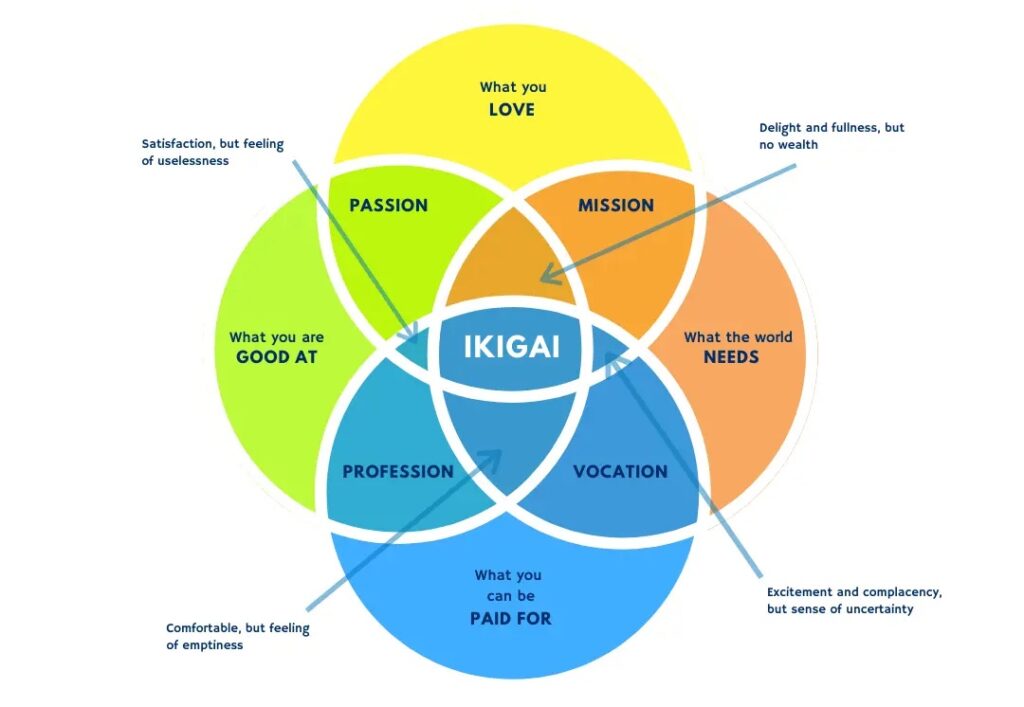
Practical Application of Ikigai In Daily Life
- Morning Rituals: Start your day with activities that align with your Ikigai, whether it’s meditation, sketching, or reading about your field of interest. This sets a tone of purpose from the moment you wake.
- Workplace Integration: If your job doesn’t match your Ikigai, find or create projects within your role that do. Many have found ways to pivot their career paths by gradually aligning them more closely with their Ikigai.
- Life Audit: Regularly assess how your daily activities contribute to your Ikigai. This might mean cutting out time-wasters or incorporating more meaning into routine tasks.
In Community and Relationships
- Community Projects: Engage in local initiatives or volunteer work that reflects your Ikigai. This not only enriches your life but also builds a supportive community around your interests.
- Teaching and Mentoring: Share your skills; this not only fulfills your purpose but also contributes to what the world needs. For example, if your Ikigai involves education, mentoring a young student could be incredibly rewarding.
Overcoming Barriers
- Fear of Change: Robert F. Kennedy Jr.’s (RFK Jr.) journey into politics, particularly his presidential campaign, showcases a willingness to challenge the status quo. RFK Jr.’s commitment to his Ikigai involves confronting powerful industries and political adversaries, emphasizing the importance of personal integrity over conformity. His work with organizations like The Waterkeeper Alliance, focusing on clean water advocacy, illustrates how dedication to one’s purpose can lead to significant societal change despite opposition.
- Financial Stability: While pursuing Ikigai, ensure you’re not jeopardizing your financial health. Sometimes, this means a phased approach, slowly integrating more Ikigai elements into your life while maintaining or establishing a financial foundation.
Ikigai and Health
The link between purpose and health is well-documented:
- Stress Reduction: Engaging in work that feels meaningful reduces stress, which is crucial for mental health. Research by the American Psychological Association supports this.
- Physical Activity: People with a purpose are more likely to engage in physical activities they enjoy, leading to better physical health. This intrinsic motivation can make exercise feel less like a chore and more like a part of their Ikigai.
- Dietary Choices: When you’re aligned with your Ikigai, you’re more likely to make health-conscious choices, seeing food as fuel for your purpose rather than just sustenance.
- Longevity: The sense of purpose provided by Ikigai contributes to what’s known as the “Happiness-Longevity Paradox,” where happier, purposeful people tend to live longer.
The Flip Side: Living Without Purpose
The Detriment of a Life Without Ikigai
In today’s fast-paced, often disorienting world, many people find themselves caught in the grind of daily life without a clear sense of what truly matters to them. Here’s how living without purpose can affect us:
- Increased Stress and Anxiety: Without a guiding purpose, life’s challenges can feel overwhelming, leading to chronic stress and anxiety. This state of being is linked to numerous health issues, from heart disease to depression.
- Lack of Motivation: Without passion or mission, work becomes merely a means to an end. This can result in a lack of motivation, reduced productivity, and a feeling of being stuck in a rut.
- Health Decline: Studies show that those without a sense of purpose might neglect their health, leading to poorer lifestyle choices and health outcomes. The body often mirrors the mind’s state of disarray.
- Social Isolation: Without the drive to engage in meaningful activities, social interactions can diminish, leading to isolation. Humans are inherently social creatures, and this isolation can exacerbate feelings of loneliness and depression.
- Existential Void: Perhaps the most profound effect is the existential void, where life feels meaningless, leading to existential crises or an ongoing sense of ennui.
Real-World Examples of Purpose Deficiency
- Corporate Burnout: Many professionals in high-stress environments report feeling like they are on a treadmill, working tirelessly without feeling fulfilled, which often leads to burnout.
- The Millennial Dilemma: With the rise of the gig economy and a shift away from lifelong careers, many young adults struggle to find their Ikigai, leading to what’s been termed the “quarter-life crisis.”
- Retirement Blues: After retirement, some individuals lose their sense of purpose, leading to a decline in health and well-being, highlighting the need for Ikigai beyond professional life.
Reclaiming Purpose
- Reevaluation: It’s never too late to find or redefine your Ikigai. Engaging in new hobbies, education, or community service can spark new interests and purposes.
- Micro-Ikigai: Small daily activities can have a purpose. Gardening, for instance, might not seem monumental, but for someone, it could be a source of peace and connection to life’s cycles.
- Volunteering: This can provide a sense of purpose by contributing to something larger than oneself, often leading to unexpected personal growth.
Modern Examples of Ikigai in Action
- Yvon Chouinard (Patagonia): His Ikigai was not just about making climbing gear but about environmental activism, which he integrated into his business model, influencing corporate social responsibility.
- Malala Yousafzai: Her passion for education for girls, combined with her mission to change the world, showcases a profound Ikigai that has inspired millions.
- Elon Musk: His drive to advance human life through technology, from electric vehicles with Tesla to space exploration with SpaceX, illustrates how one’s Ikigai can manifest in multiple, impactful ventures.
Conclusion: Living Your Ikagai
Embracing Ikigai doesn’t mean you’ll never face challenges or feel unfulfilled moments. However, it equips you with a compass for life’s journey, guiding you towards decisions that resonate with your deepest self. Here’s a final thought:
Ikigai is the tea ceremony of life, where every action is purposeful, every movement is deliberate, and the essence is to savor the entirety of existence with gratitude.
As we navigate through life’s complexities, let Ikigai be your guide, not just for health and longevity, but for a richer, more meaningful existence. Remember, your Ikigai might evolve as you do, but the process of discovering and rediscovering it is a journey worth taking.
